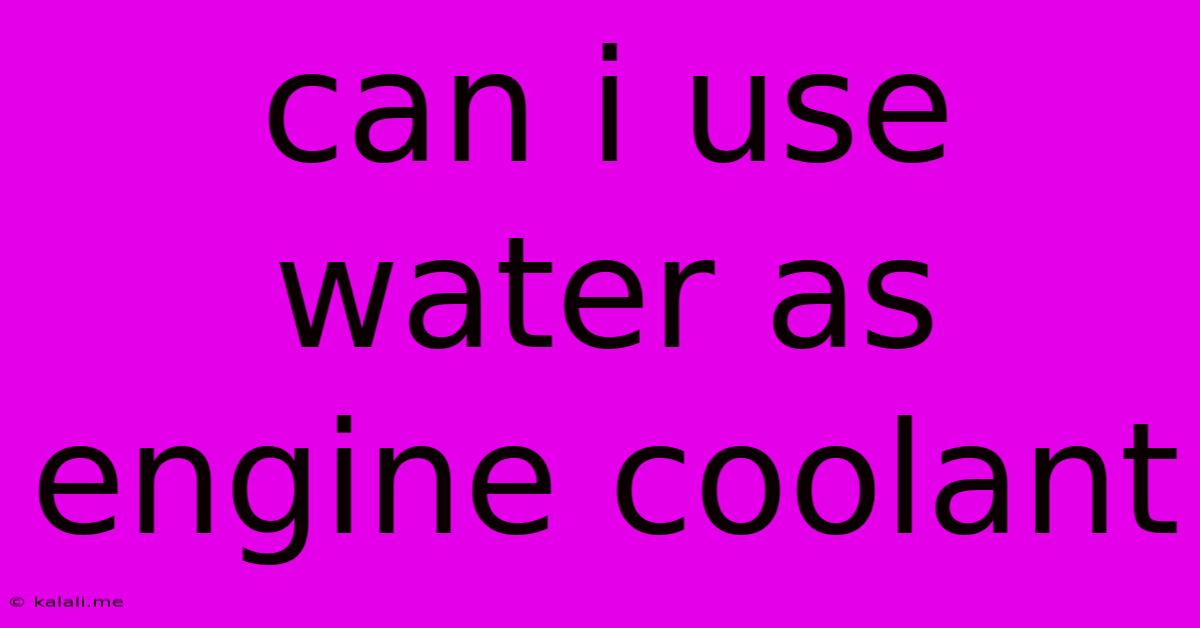Can I Use Water As Engine Coolant
Kalali
May 21, 2025 · 3 min read

Table of Contents
Can I Use Water as Engine Coolant? A Deep Dive into the Risks and Rewards
Meta Description: Thinking about using water as engine coolant? This article explores the pros and cons, examining the potential risks and benefits, helping you decide if it's a safe and effective choice for your vehicle. Learn about the crucial role of coolant and the dangers of using only water.
Using water as engine coolant might seem like a simple, cost-effective solution, especially in a pinch. However, the reality is far more nuanced. While water can temporarily cool an engine, relying on it as a long-term coolant replacement is highly discouraged and carries significant risks. This article will delve into the reasons why, exploring the crucial role of coolant and the potential damage caused by using only water.
The Importance of Engine Coolant
Before we discuss the viability of using water, let's understand the critical function of engine coolant. Engine coolant, also known as antifreeze, isn't just water. It's a carefully engineered mixture of water and ethylene glycol (or propylene glycol in some cases), along with corrosion inhibitors and other additives. This complex formulation performs several vital roles:
- Heat Transfer: The primary function is efficient heat transfer. Coolant circulates through the engine block, absorbing heat from combustion and transferring it to the radiator for dissipation.
- Corrosion Protection: Engine components are exposed to harsh conditions, including high temperatures and various chemicals. Coolant additives protect against rust, corrosion, and scaling, extending engine lifespan.
- Freezing and Boiling Point Modification: Pure water freezes at 0°C (32°F) and boils at 100°C (212°F). Coolant raises the boiling point and lowers the freezing point, preventing damage from extreme temperatures.
- Lubrication: Some coolants offer lubrication properties, protecting water pump seals and other critical components.
Why Using Only Water is a Bad Idea
Using only water as engine coolant exposes your vehicle to several serious risks:
- Freezing Damage: In cold climates, water will freeze, expanding and potentially cracking engine blocks, cylinder heads, and radiator components. This damage can be extensive and costly to repair.
- Boiling Over: Water's lower boiling point means it's more susceptible to overheating. This can lead to warped cylinder heads, blown head gaskets, and catastrophic engine failure.
- Corrosion: Without the corrosion inhibitors present in proper coolant, internal engine components are vulnerable to rust and scaling, reducing efficiency and lifespan.
- Cavitation: As the water boils, it can create vapor bubbles that collapse violently, damaging water pump impellers and other sensitive parts. This phenomenon is called cavitation.
- Lack of Lubrication: The absence of lubricating additives in pure water can lead to premature wear and tear on water pump seals and other components.
Short-Term Use: A Risky Proposition
While you might consider using water in a true emergency, such as a coolant leak in a remote location, this is a temporary fix at best. It's crucial to add proper coolant as soon as possible and have the leak repaired by a qualified mechanic. Even short-term use of water carries some risk, especially in extreme temperatures.
Alternatives to Traditional Coolant
If you're looking for more environmentally friendly options, consider coolants made with propylene glycol, which is less toxic than ethylene glycol. Always choose a coolant specifically formulated for your vehicle's make and model.
Conclusion: Don't Gamble with Your Engine
Using water as a long-term replacement for engine coolant is a risky gamble. The potential for costly engine damage far outweighs any perceived savings. Stick to the manufacturer's recommended coolant for optimal engine performance, longevity, and reliability. While a temporary water solution might seem appealing in a dire situation, prioritize professional repair and the use of proper coolant to maintain the health of your vehicle's engine.
Latest Posts
Latest Posts
-
Why Does My Cat Stare At The Wall
May 21, 2025
-
I Am The First And The Last
May 21, 2025
-
How To Sync The Wii Fit Board
May 21, 2025
-
How Old Is The Earth According To The Quran
May 21, 2025
-
How To Open A Door When The Handle Is Broken
May 21, 2025
Related Post
Thank you for visiting our website which covers about Can I Use Water As Engine Coolant . We hope the information provided has been useful to you. Feel free to contact us if you have any questions or need further assistance. See you next time and don't miss to bookmark.